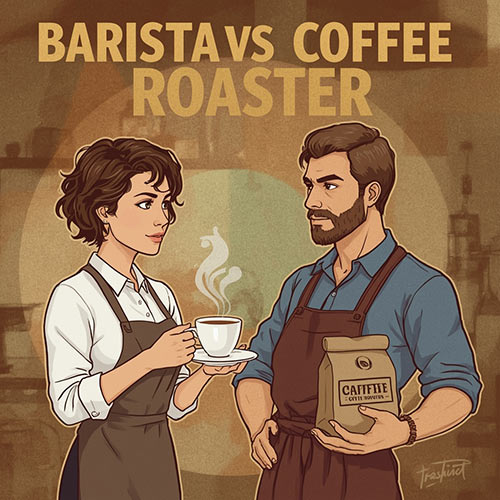Barista vs Coffee Roaster: What’s the Difference?
When you think of coffee careers, two roles often come to mind: Barista and Coffee Roaster. Both are essential in bringing that perfect cup to life, but they focus on completely different stages of the coffee journey. A coffee roaster works behind the scenes, transforming raw green beans into aromatic roasted coffee. A barista, on the other hand, stands at the front line — crafting espresso drinks, interacting with customers, and shaping the café experience.
If you’ve ever wondered which path is right for you, this guide will walk you through their differences, responsibilities, required skills, and career potential — ultimately helping you decide. Spoiler: If you love fast-paced environments, human connection, and hands-on drink artistry, becoming a barista might just be your winning choice.
1. What Does a Barista Do?
A barista is the coffee artist you see in cafés and coffee shops. They prepare espresso drinks, pour latte art, steam milk, and create balanced flavors that meet customer preferences. But the role isn’t just about pulling shots — it’s also about hospitality.
Daily Tasks Include:
- Operating espresso machines and grinders.
- Dialing in the grind size and brew time for perfect extraction.
- Crafting espresso-based drinks like cappuccinos, lattes, and flat whites.
- Maintaining cleanliness and hygiene standards.
- Taking orders, handling payments, and engaging with customers.
Pro Tip: Great baristas don’t just serve coffee, they create experiences. Remember customers’ names, favorite drinks, and small details. This personal touch is what makes people loyal to a café.
2. What Does a Coffee Roaster Do?
A coffee roaster works primarily behind the scenes. Their job is to take green coffee beans and roast them to specific flavor profiles. It’s a mix of science, art, and precision.
Daily Tasks Include:
- Operating roasting machines.
- Monitoring roast profiles, temperatures, and times.
- Experimenting with roast levels to highlight unique bean characteristics.
- Performing quality control through cupping sessions.
- Managing green bean inventory and sourcing.
Pro Tip: Coffee roasting requires patience and meticulous record-keeping. If you enjoy technical work, sensory evaluation, and long stretches of focused activity, this could be a rewarding career path.
3. Key Differences Between Barista and Coffee Roaster
| Aspect | Barista | Coffee Roaster |
|---|---|---|
|
Work Environment |
Front-facing, customer-oriented |
Behind-the-scenes, production-oriented |
|
Main Focus |
Preparing and serving coffee drinks |
Transforming green beans into roasted coffee |
|
Pace |
Fast and dynamic |
Methodical and measured |
|
Interaction |
High customer interaction |
Minimal customer interaction |
|
Skill Set |
Drink-making, hospitality, speed |
Sensory analysis, roasting machine operation |
4. Skills Needed for Each Role
Coffee Roaster Skills
- Roast profile management.
- Green coffee sourcing knowledge.
- Sensory analysis for flavor profiling.
- Machine operation and safety.
5. Which Role Pays More?
In most markets, experienced coffee roasters tend to have slightly higher salaries than entry-level baristas because roasting is a specialized skill. However, baristas in high-end cafés or those with management roles can earn competitive wages, plus tips. In Bangladesh, a skilled barista in an upscale café can make a solid income with opportunities for side hustles like teaching latte art or catering events.

6. Career Growth Potential
Both careers offer advancement opportunities, but in different ways.
- Barista Growth: Shift supervisor → Head barista → Café manager → Café owner or trainer.
- Roaster Growth: Roasting assistant → Head roaster → Green coffee buyer → Roastery owner.
7. Why Barista Might Be the Better Choice for You
While both roles are rewarding, a barista often wins for those who love people, creativity, and variety in their day. You’re constantly learning from latte art competitions to experimenting with new brewing methods.
Example: Imagine a customer comes in asking for a new flavor profile in their cappuccino. As a barista, you get to experiment in real-time, blending your brewing knowledge with creativity, and instantly see the customer’s reaction.
Pro Tip: Start as a barista to build foundational coffee knowledge. If you later decide to explore roasting, your barista experience will give you a strong advantage in understanding flavor from the consumer’s perspective.
8. Can You Do Both?
Yes! Many coffee professionals start as baristas, then move into roasting, or even split their time between the two. However, balancing both can be challenging since each requires focus and skill.
9. Choosing Based on Your Personality
- If you love fast-paced, social environments, go for a barista.
- If you enjoy technical precision and quiet work, coffee roasting might be for you.
- If you want a blend of both worlds, start as a barista and cross-train in roasting later.
10. Steps to Start Your Barista Journey
- Take a Professional Barista Course – Look for ISO-certified training like GBTA in Bangladesh for recognized credentials.
- Practice at Home – Set up a small espresso station to hone your skills.
- Work in a Café – Get real-world experience and learn from seasoned professionals.
- Join Competitions – Latte art throwdowns and brewing competitions are great for networking.
- Keep Learning – Coffee trends evolve, so stay updated through workshops and coffee expos.
Pro Hacks for Aspiring Baristas
- Master Dialing In: Learn to adjust grind size and brew time to get consistent espresso shots.
- Perfect Milk Steaming: Aim for silky micro-foam; it’s the secret to beautiful latte art.
- Engage with Customers: A smile and genuine conversation can turn a casual visitor into a loyal customer.
- Clean as You Go: Keeping your station spotless boosts efficiency and professionalism.
Final Verdict: Barista or Coffee Roaster?
Both careers are deeply connected to the love of coffee, but they suit different personalities and lifestyles. Coffee roasting is perfect for those who love methodical, sensory-driven work with minimal interruptions. Being a barista, however, offers creativity, customer interaction, and immediate feedback on your craft.
If you want a coffee career that blends artistry, hospitality, and endless learning opportunities, becoming a barista is the ideal choice, especially in Bangladesh’s growing specialty coffee scene.


One Response